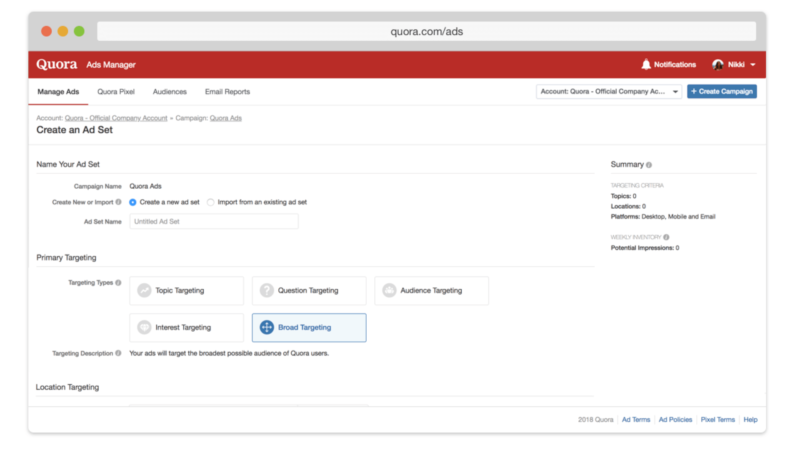Quora introduces Broad Targeting, says audience hits 300 million monthly users
Broad Targeting relies on machine learning to optimize ad delivery to reach users most likely to take the desired action.
 Question-and-answer platform Quora says it now has an audience of 300 million monthly unique users, up from 200 million reported last year. The company also announced the launch of Broad Targeting. With this targeting option, ads run across the platform and adapt their targeting as the system learns which audiences engage with the ads.
Question-and-answer platform Quora says it now has an audience of 300 million monthly unique users, up from 200 million reported last year. The company also announced the launch of Broad Targeting. With this targeting option, ads run across the platform and adapt their targeting as the system learns which audiences engage with the ads.
Why you should care
Quora may not rival giants Facebook or Google with audiences in the billions, but to put Quora’s audience of 300 million monthly users in perspective, Twitter reported 335 monthly active users (MAU) in Q2; Reddit claims to have 330 million MAU; and Pinterest said this month it has 250 million MAU. For marketers evaluating so-called second-tier platforms, Quora’s reach puts it squarely in the mix.
Also, Quora’s new Broad Targeting relies on machine learning to optimize ad delivery to reach users most likely to take the desired action.
It’s worth noting that Quora’s ad business is just over a year old. The company has staffed up with ex-Facebook and Google advertising folks who have quickly built out Quora’s ads platform with relatively sophisticated features for a new platform, including multi-event conversion tracking, retargeting and lookalike targeting. Other targeting options include Topic, Question and Interest targeting.
More on Broad Targeting
- Broad Targeting is now an option at the ad set level in the Quora Ads interface.
- The option puts Quora’s algorithms in control of identifying which audiences to target rather than relying on contextual or audience signals set by advertisers.
- For those tracking conversions with Quora’s Pixel, the company recommends using Broad Targeting with Conversion Optimized Campaigns introduced in August, to improve its ability to target ads to audiences deemed likely to convert.
Contributing authors are invited to create content for MarTech and are chosen for their expertise and contribution to the search community. Our contributors work under the oversight of the editorial staff and contributions are checked for quality and relevance to our readers. MarTech is owned by Semrush. Contributor was not asked to make any direct or indirect mentions of Semrush. The opinions they express are their own.
Related stories